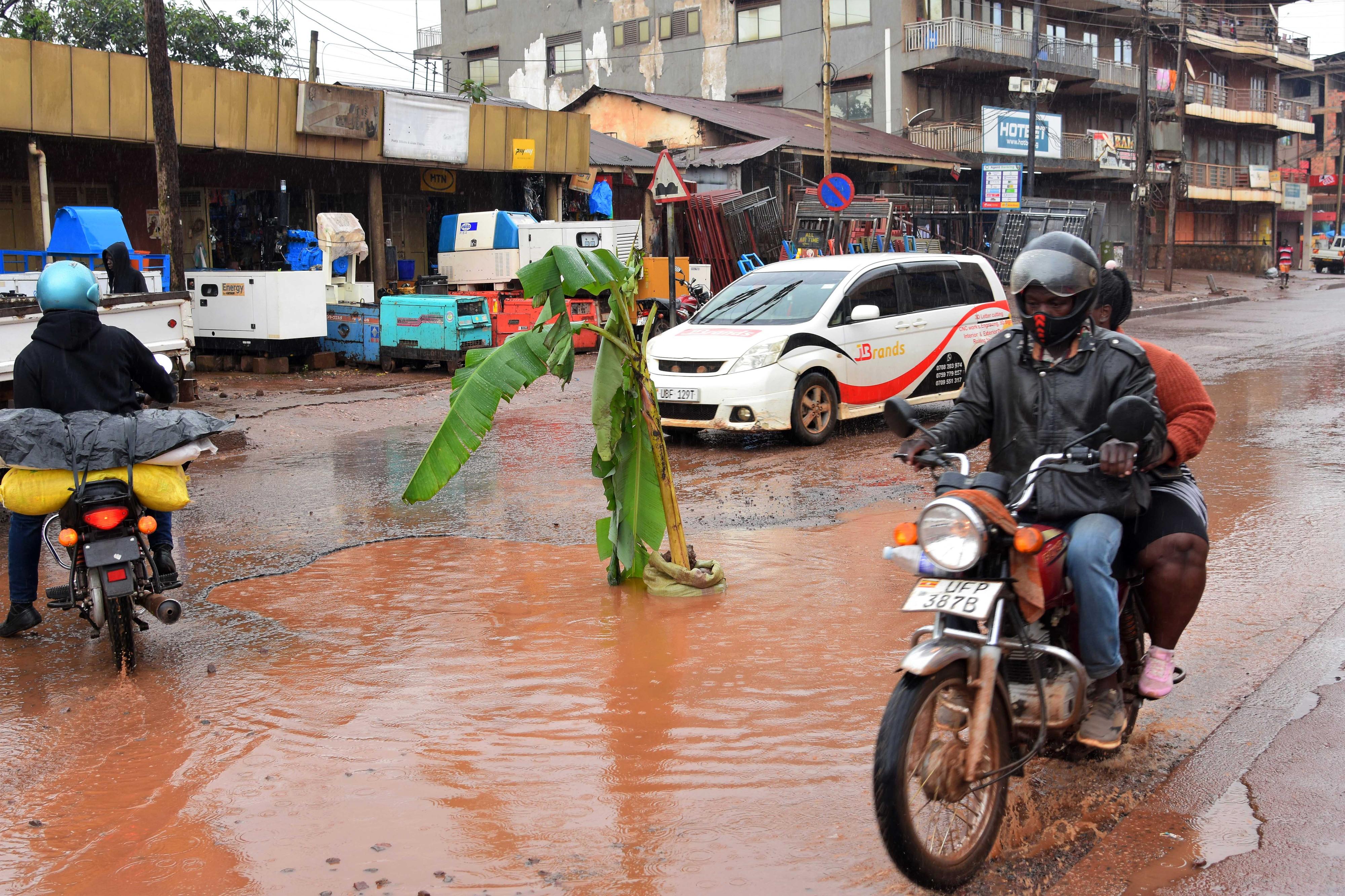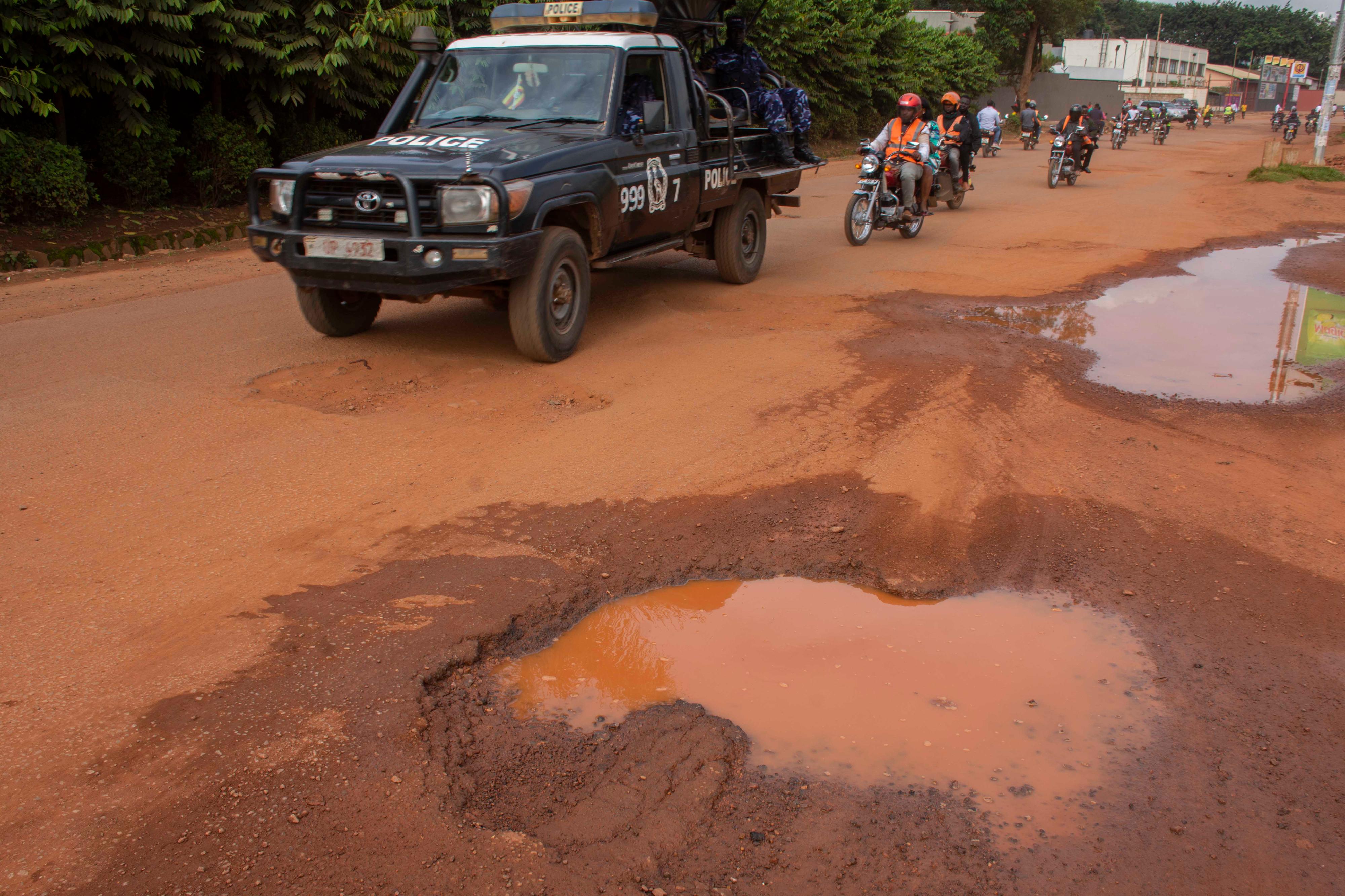Prime
KCCA roads: A spotlight into ‘inflated’ expenditure

KCCA workers fill potholes with soil near the railway line on Mukwano Road in Kampala City on April 13. PHOTO/FRANK BAGUMA
What you need to know:
- As the government continues to reconstruct the messy Kampala city road network, Kampala City Lord Mayor Erias Lukwago says unless the corruption involved in road pricing ends, the funding will be in vain. This comes after the government tabled a loan request in Parliament to bankroll a new phase of roadworks in the Greater Kampala Metropolitan Area, writes Chris.P. Kayonga.
The terminal decline of Kampala City Council Authority’s road network recently captured the public imagination through an exhibition on the micro-blogging site, Twitter.
But the political wing at City Hall led by the Lord Mayor, Erias Lukwago, fears that the cost of road construction will continue to be inflated as long as lucrative tenders remain a preserve of syndicated cartels that seeks to feather their nests.
“The network is very wide. The racket involves key figures in the central government, very influential figures in the central government and their proxies within the institution of KCCA. They are concocting these figures,” he argues.
Whereas there is a lofty dream to re-construct Kampala’s moribund roads to blend with its green vegetation and give the city a pristine image, it may be deviated by the country’s ferocious borrowing appetite to feed corrupt cartels and their puppet masters.
Last week, the government tabled a loan request of Shs2.26 trillion in Parliament to bankroll a new phase of road construction under the Greater Kampala Metropolitan Area Urban Development Programme, but without undertaking an audit to probe the allegations of corruption, Mr Lukwago fears that the funding will be in vain.
“We don’t want to indulge in another postmortem. The World Bank [money] has already been spent, but this ADB money, the Shs1 trillion is yet to be spent. And that is why we raised the red flag that before it is squandered, before it is siphoned off, please make an intervention,” Mr Lukwago told Nation Media Group.
New project
A new phase of road construction financed by the African Development Bank (ADB) under the Kampala City Roads Rehabilitation at the cost of $288m— the equivalent of Shs1 trillion— has commenced.
Initially, the funds were estimated to construct at least 200kms of the road network, but it has significantly been reduced to only 69km where each km will be constructed at an astronomical Shs15.4b.
Engineer Andrew Muhwezi, the President of the Uganda Institution of Professional Engineers, told Nation Media Group that “a figure in the range of Shs6b per km would be a fair estimate”.

Lord Mayor Erias Lukwago
However, Muhwezi says “If the contractor encounters a rock, this was not foreseen so they can claim for more [money]. If they find a sewer line and it was not anticipated along the way, it has to be relocated to another place. The client will continue to pay for more. But if it is a lump sum contract and you the contractor find a rock, you must absorb it. For that reason, to safeguard themselves against the risk in the pricing, the contractor will also factor it in. So that is why a lump sum contract may appear a little high.”
Lifting the lid off this bill of quantities, we discovered that some costs were deliberately inflated and duplicated to increase the cost of road construction.
About Shs925m under this project has been doled out towards capacity building to impart skills to women and youth. There is no clarity on how this fund will be spent, but according to the breakdown, the construction firms will offer construction and entrepreneurship development and training in business skills to women and youth.
As part of the public transport blueprint, the ADB project plans to roll out 50 eco-buses at a cost of Shs44.4b. The State minister for Kampala Capital City and Metropolitan Affairs, Mr Kabuye Kyofatogabye, says the vote on buses has been halted and repurposed towards road construction.
Compensation and resettlement of project-affected persons will cost Shs40.7b. Unlike roads that connect towns across the countryside where road reserves have been occupied, compensation may not affect a substantial number of people during the construction of arteries connecting the city road infrastructure.
For instance, there is barely much compensation for the reconstruction and re-dualling of the Port Bell and Spring Roads, currently underway, which snakes through Nakawa.
Mohamoud Kasule, who is a property owner in Mutungo, Nakawa Division, says: “Those who will be affected by this road project are very few. In our zone, there is only one person, the owner of the petrol station.”

Kabuye Kyofatogabye, Minister of State for Kampala Capital City and Metropolitan Affairs
Financial audit
Another cost, which raises eyebrows involves a financial audit. It includes the supervision of civil works, the monitoring and technical financial audit by the office of the Auditor General and the development of the urban design guidelines, which will cost Shs55.3b.
Whereas there is no detailed breakdown to explain for instance how much the supervision of civil works will cost, what raises suspicion is budgeting for the cost undertaken by the office of the Auditor General, which is a constitutional mandate by this office.
For instance, under Lot 1 Kampala City Roads Rehabilitation roads, a contract worth Shs149.4b was signed between KCCA and China State Construction Engineering Corporation Limited in 2022 to pave 8.07 km of roads and reconstruction 0f 6.83 km of roads in RSubaga and Makindye divisions.
A total of Shs14.9b was allocated under general requirements and provisions, Shs8.6b was allocated for the establishment of a site for contractors and engineers’ accommodation and Shs191m was established for environmental protection and waste disposal and Shs611m was doled out on occupational health and safety, HIV/Aids and Gender campaign.
But there is duplication as KCCA runs an HIV/Aids campaign with the Infectious Disease Institute (IDI) and the Health ministry.
Dr Joanita Kigozi, the Deputy Head of Department at Infectious Disease Institute in charge of Health Systems Strengthening, told Nation Media Group: “Kampala Capital City Authority facilities have health workers already paid through government structures, however, as they come out of office, they will attract transport and allowance for the day.
And then communication materials, again this is already available through the different communication partners. If you have to buy condom dispensers, condoms and antiretroviral drugs, they are already available at the health facilities as they have come through National Medical Stores and Joint Medical Stores.”
We asked a private health service provider whose identity we shall not disclose to provide a budget for about 300 employees to be provided with condoms. According to the quotation, each employee would receive a pack of three condoms and the total cost for the provision of condoms to 300 employees is Shs369,000. This means that 900 employees would each receive a pack of three condoms at the total cost of Shs1,107,000 million.
Another colossal sum of Shs9.9b was allocated for the alteration of water, electricity and telecom utility services and another Shs3.2b was allocated to the construction of weigh bridges, public toilets, traffic barricades, bus shelters and street markets. Under the Bill of Quantities, provided by the Chinese firms, there is no detailed breakdown of these costs.
We also scrutinised the lot 2 contract for the reconstruction of 10.1 km of Port Bell and Spring roads awarded to Chinese construction firm Zheijang Construction Group Company Limited at a cost of Shs138b.
Initially, the reservation price for the construction of the Port Bell and Spring roads was estimated at Shs175b by KCCA’s engineering department, which meant that each km would cost a staggering Shs17b before it was revised to Shs138b.
Under the bill of quantities, general requirements and provisions received a vote of Shs18.6b, the contractor’s establishment on site and general obligations got Shs4.3b. This figure is provided as a lumpsum and only provides ambiguous terms such as fixing obligations at Shs2.2b and time-related obligations at Shs2.1b.
Accommodation
The engineer’s accommodation and attendance upon the site was allocated Shs4.8b, environmental protection and waste disposal was allocated Shs106 million and occupational health and safety, HIV and Gender received Shs1.09b. Shs14.3b has been doled out towards the removal of utility services such as electricity, water and telecom services, which is a cost that should be shouldered by utility firms.
Mr Lukwago says “legislation has made it very clear that once time comes for the construction of those roads and the roads authority requires that company to relocate those utility lines, it shall be done at the cost of the owners of those utility lines. We are not required to spend a single coin on the relocation of utilities once they are in the road corridor.”
But Mr Kyofatogabye says “We spent Shs10b relocating utilities along Port Bell Road. KCCA doesn’t pay for that. It is the contractor paying out of the cost for that particular road.”
For this specific contract to reconstruct Spring and Port Bell roads, KCCA has been compelled to purchase a four-wheel station wagon for the engineer, double-cabin pickup for the engineer’s staff, survey equipment, setting up a laboratory with furniture, and provide communication facilities, including mobile phones among others.

KCCA Executive Director Dorothy Kisaka appears before Parliament’s Committee on Commissions, Statutory Authorities and State Enterprises on March 2. PHOTO/DAVID LUBOWA
Lot3 project
Under Lot 3, KCCA awarded a contract to China Railway 18 th bureau group to construct 18.84 km of roads in Makindye, Central, Kawempe, and Lubaga divisions at the cost of Shs151b.
Initially, the directorate of Engineering estimated the reconstruction to cost an astronomical Shs223b before it was reduced to Shs151b. Among the bill of quantities is a vote for occupational health and safety towards HIV/Aids prevention budgeted at Shs639m. This will largely focus on the distribution of condoms and safety campaigns for workers. The contractor’s establishment of site and general obligations was allocated Shs350m.
The contractor has a vote for general requirements and provisions including the construction of public roadside toilets, roadside weighbridges, traffic police booths, traffic barricades, bus shelters, street markets, and improvements on roadside markets. These items will cost a colossal sum of Shs15.5b.
Landscaping and grassing on 6th Street, 7th Street and 8th Street will cost Shs355m, Shs 343m and Shs530m respectively bringing the total cost to Shs1.22b.
Across the Kampala City Roads Rehabilitation project contracts, the Bill of Quantities included several items that were duplicated resulting into higher costs.
An amount of Shs254 million is recorded twice under the category of HIV/Aids and STD prevention and counselling and under another category of clothing and safety equipment with exactly the same details. It is not clear yet whether this was a mistake or a deliberate falsification to inflate the costs.
Kenya cost
Records from the Kenya Road Board, Kenya National Bureau of Statistics, Kenya National Highways Authority indicate that the 5km Kericho by-pass recently completed, cost Shs12b and each km cost Shs2.4b, a stark contrast with the cost for the construction of roads in Kampala city.
But Muhwezi says there is need to consider other salient issues.
“The longer the design life, the higher the unit cost, all other factors remaining constant. So, as you put questions to engineers why the unit cost is different here and there is an attempt to quickly compare with other countries. We should compare equals with equals. If it is 10 years in Uganda and 10 years in the comparative country then the other drivers to the unit cost will be the local conditions.”
Word Bank rating
The World Bank research on the cost of Road Infrastructure in ‘Low and Middle-Income Countries’ published in 2015, revealed that the cost of road construction may raise as a result of conflict and the rugged terrain. There is no trace of conflict or rugged terrain that may have led to an increment in the cost of road construction in Kampala and its outskirts.




